May 23, 2025 | 05:08 GMT +7
May 23, 2025 | 05:08 GMT +7
Hotline: 0913.378.918
May 23, 2025 | 05:08 GMT +7
Hotline: 0913.378.918
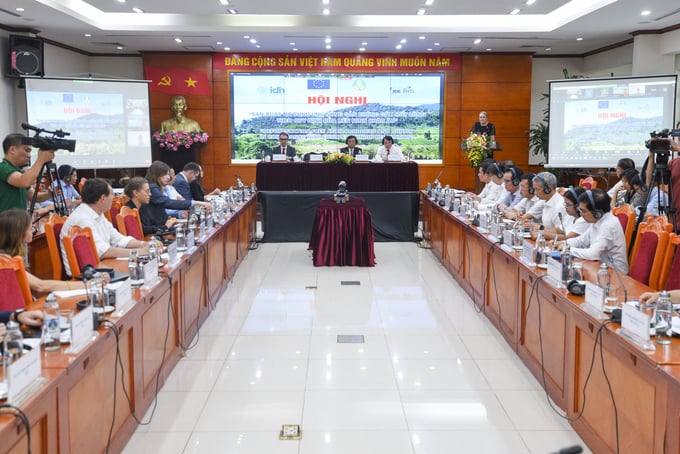
The conference on “Deforestation-free coffee production and supply in compliance with European Union regulation” on June 29 at MARD office. Photo: Tung Dinh.
On May 16, 2023, the European Parliament approved the European Union Deforestation-free Regulation (EUDR). Wood, wood products, coffee, and rubber – the main export sectors of Vietnam – will be affected when this Regulation is applied.
According to this Regulation, 100% of some agricultural products in Vietnam, especially coffee, when imported into the European market, need to provide GPS coordinates of all lands and products’ traceability. This information will determine the potential for deforestation by remote sensing monitoring systems.
In response, on June 29, the Ministry of Agriculture and Rural Development (MARD), in collaboration with the EU representatives and the Sustainable Trade Initiative – IDH, organizes the conference “Deforestation-free coffee production and supply in compliance with European Union regulation.”
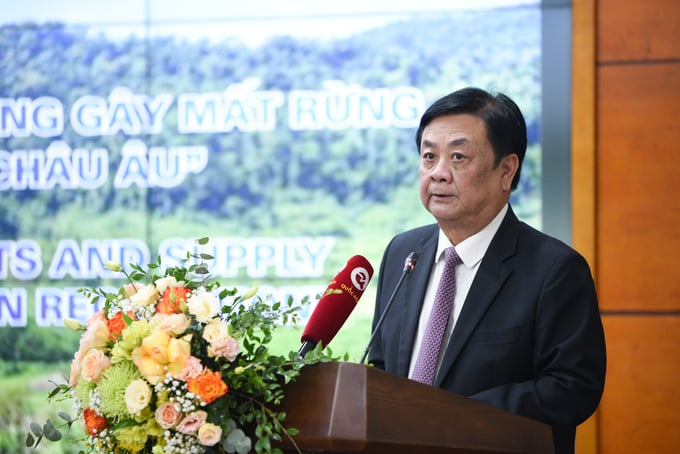
Minister Le Minh Hoan said that EUDR will offer many opportunities to develop Vietnam’s agricultural sector. Photo: Tung Dinh.
The conference is co-chaired by MARD Minister Le Minh Hoan and Ms. Florika Fink-Hooijer, Director General of the Environment Department of EC, with the participation of Mr. Giorgio Aliberti, EU Ambassador, and Mr. Pham S, Vice Chairman of the People’s Committee of Lam Dong Province. Over 100 delegates also attend, including representatives of departments under MARD, local authorities of the Central Highlands provinces, EU members, leaders in the coffee industry, and national and international development organizations.
This event is organized to inform attendees about the general requirements of EUDR, as well as opportunities and challenges that the new Regulation can bring to Vietnamese agricultural products. Organizers also propose solutions to support the industry in meeting new regulations within the 18 - 24 month preparation period set by the EU.
In addition, the National Agriculture Policy Framework in response to the EUDR is also presented for the first time to important representatives of the Vietnamese agricultural sector and relevant international agencies.
At the conference, MARD Minister Le Minh Hoan emphasizes: “The regulation, once comes into force, is expected to take effect from December 2024. This will directly affect actors in the supply chains of the aforementioned industries. Industry supply chains will face many challenges in meeting the EUDR, especially in matters of location data, traceability, monitoring system, and anti-deforestation response.
MARD considers compliance with this Regulation not only to meet the requirements of exporting coffee, rubber, wood, and wood products to the EU market, but also an opportunity to develop the agricultural sector. Vietnamese industry follows the industry’s strategic orientation of transparency, accountability, sustainability, and green growth.”
The Minister highly appreciates the coherent cooperation and effective support of the EU over the past time, making an important contribution to the transformation of Vietnam’s agricultural sector towards “transparent, responsible, sustainable, and green growth.”
“The EU’s pioneering policies, such as the Green Deal, From Farm to Fork, and circular economy, have inspired and become a reference point for the Ministry in formulating a sustainable agriculture and rural development strategy, especially beneficial to sub-sectors,” MARD minister states.
In the conference, Minister Le Minh Hoan proposes that the EU have a program to support the value chains of Vietnam’s agricultural sector, with close attention to small-scale actors so that they meet the requirements of the Regulation.
Besides, he suggests that the EU share its past experiences and effective models for small-scale actors to meet the EUDR. He requests the EU to support the development and implementation of the Green Growth Project for Vietnam’s coffee industry.
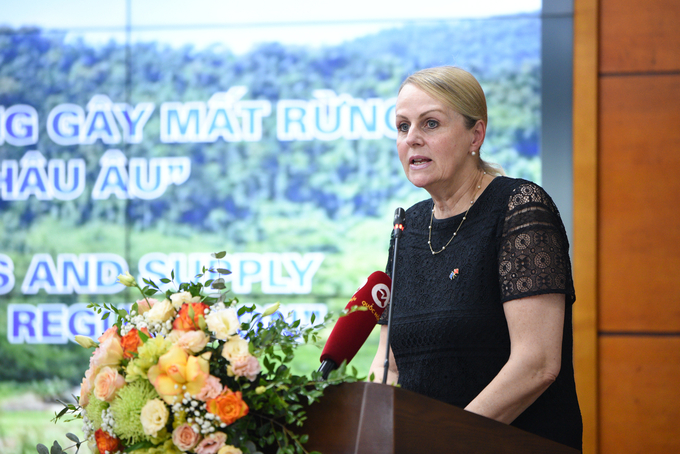
Ms. Florika Fink-Hooijer, Director General of the Environment Department of the European Commission delivers “European Anti-Deforestation Regulations” at the conference. Photo: Tung Dinh.
On the EU side, Ms. Florika Fink-Hooijer says: “90% of global deforestation is caused by agriculture. As a large consumer market, the EU realizes its crucial role in the problem. That’s why the EU recently announced EUDR to combat deforestation. Due diligence obligations and traceability requirements will be applied rigorously, without discrimination, to all products involved.”
In addition, the EU representative also pledges to support Vietnam toward sustainable development: “Through the mutual effort, the EU and Vietnam will work together towards solving global challenges effectively, contributing to the prosperity of the Vietnamese people as well as preserving the country’s unique natural heritage.”
Meanwhile, Ms. Tran Quynh Chi, Regional Director of Asia Landscape at the Sustainable Trade Initiative IDH, affirms the crucial role of the public-private partnership during the implementation solutions to respond to EUDR in Vietnam: “Vietnam’s agriculture in general and the coffee industry, in particular, have established a foundation of multi-party cooperation to promote sustainable development for many years. However, the EUDR will be a fundamental shift for the entire industry towards transparency and sustainability, meeting the diverse requirements of the market and buyers like no other, while maintaining deforestation-free, low emissions, and household livelihoods.”
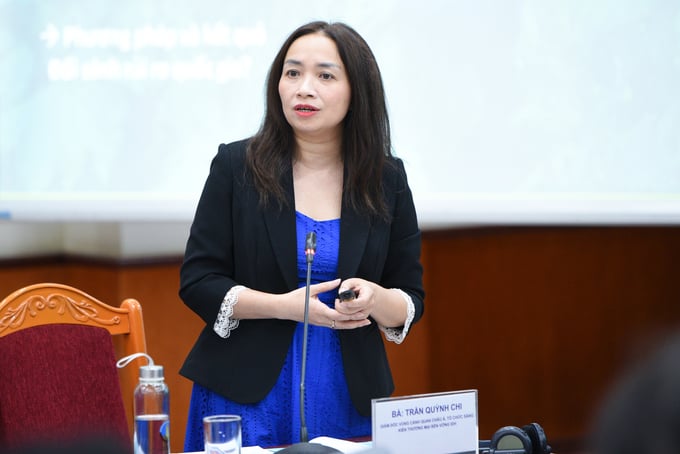
Ms. Tran Quynh Chi, Regional Director of Asia Landscape at the Sustainable Trade Initiative IDH shares her experience in developing the coffee landscape. Photo: Tung Dinh.
Ms. Tran Quynh Chi has a 10-year of experience implementing the Sustainable Landscape Program in the Central Highlands with state management agencies and companies such as JDE Peet’s, Simexco, Intimex, ECOM and LDC. Therefore, IDH is committed to cooperating with central and local partners to carry out synchronous activities in response to EUDR in Vietnam.
In addition, IDH will continue calling for domestic, and foreign companies, and organizations to participate and contribute to the action program, thereby creating crucial impacts on all three aspects: responsible production, resource protection, and social security.
From the perspective of one of the world’s leading coffee buyers, at the conference on June 29, JDE Peet’s demonstrated their commitment to co-invest and participate in implementing an action plan in response to EUDR.
Accordingly, JDE Peet’s is well aware of their role in promoting sustainable development of the global coffee industry. Therefore, responding to EUDR, this company is committed to working closely with partners such as MARD, Central Highlands provinces, IDH, and other businesses sharing a mutual aim to develop and implement synchronously innovative solutions, aiding the Vietnamese coffee industry to adapt to these new regulations.
“Through this public-private partnership, we believe that we will make positive impacts, protecting forest resources, reducing greenhouse gas emissions, and improving the livelihoods of local communities and family households, especially those in high-risk areas”, JDE Peet’s representative emphasizes.
Also at the conference, MARD leaders, EC representatives, and related agencies signed a Memorandum of Understanding to support Vietnam’s coffee industry to reduce emissions, cause no deforestation or forest degradation, and ensure livelihoods for farmers.
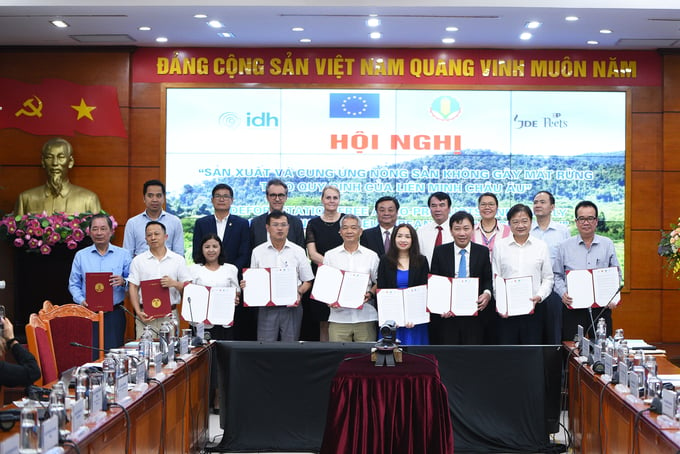
A Memorandum of Understanding on developing the coffee industry to reduce emissions, causing no deforestation or forest degradation and ensuring livelihoods for farmers was signed at the conference. Photo: Tung Dinh.
At the conference, Mr. Nguyen Do Anh Tuan, Director of the International Cooperation Department (MARD) presented the National Action Plan for Vietnam’s agricultural sector to meet EUDR. It includes stages of building a public-private partnership; promotion and advocacy; technical solutions; a dialogue channel; and resource mobilization. The first task is to establish public-private partnership groups for sectors affected by EUDR and implement public-private partnership activities. Following this, technical guidelines will be developed, and the EUDR will be disseminated to management agencies at all levels and actors in the industry value chains. With technical solutions, it is necessary to build and develop a national database on planting areas; as well as transparent and responsive mechanisms. The next step is to develop and implement traceability, strengthening forest protection, i.e. community patrol or monitoring to protect forests. In addition, the development and implementation of sustainable livelihood transformation models in risk areas are in need. At the same time, a regular dialogue channel with the EU will be established for synthesizing and sharing information periodically. Another important issue is mobilizing financial and technical support from international organizations and the private sector to support industry value chains in adapting to EUDR.
Translated by Quynh Chi
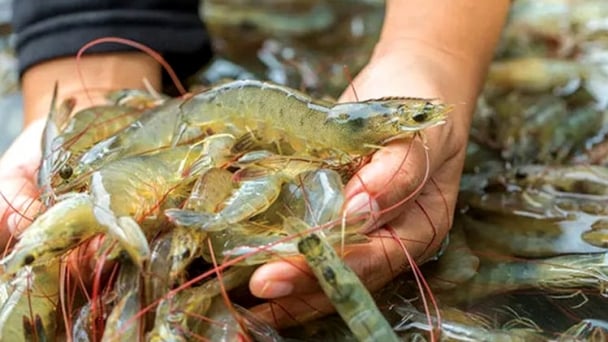
(VAN) A study assessing the carbon footprint of whiteleg shrimp farming in China shows the potential for carbon emission reduction through the use of renewable energy.
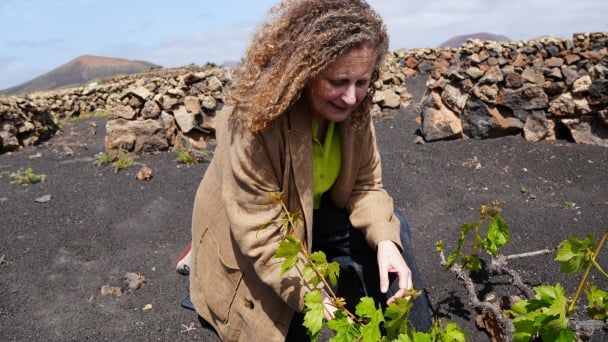
(VAN) Brazil, China, Mexico and Spain receive new designations of Globally Important Agricultural Heritage Systems from FAO.
![Reducing emissions from rice fields: [3] New values generated from carbon credit](https://t.ex-cdn.com/nongnghiepmoitruong.vn/608w/files/content/2025/05/19/dsc09613-144700_71-150957.jpg)
(VAN) In addition to helping safeguard the environment, the low-emission rice cultivation model also generates new opportunities for farmers by leveraging the carbon credit market.
![Ho Chi Minh city adapts to climate change: [1] Vulnerable in the whirlwind of development](https://t.ex-cdn.com/nongnghiepmoitruong.vn/608w/files/duyenht92/2025/05/19/3131-ngap-nongnghiep-163121.jpg)
(VAN) As the country's economic engine with a rapid urbanization rate, Ho Chi Minh city is facing increasingly serious consequences of climate change.
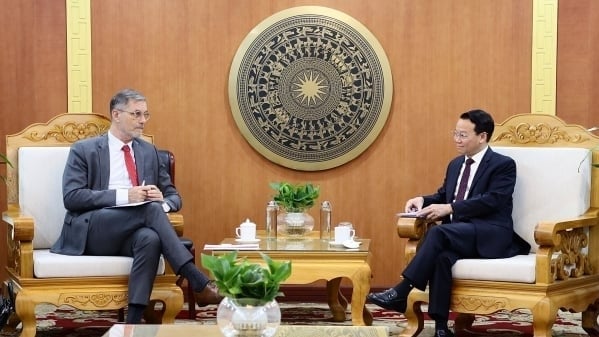
(VAN) On May 21, Minister of Agriculture and Environment Do Duc Duy worked with Mr. Olivier Brochet, Ambassador Extraordinary and Plenipotentiary of the French Republic to Vietnam.
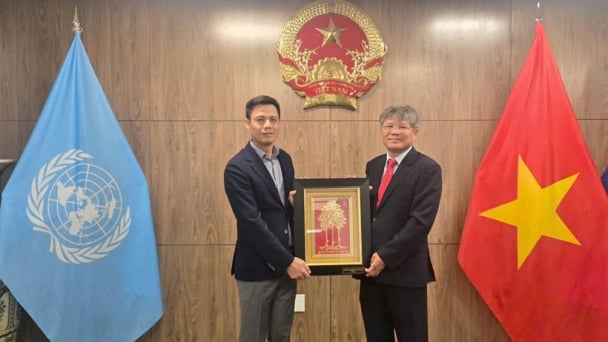
(VAN) VRG recently conducted a visit and working trip to the United States to demonstrate its efforts in redefining the role of rubber enterprises in the global value chain.

(VAN) In 2024, over 295 million people across 53 countries and territories faced acute hunger—an increase of almost 14 million people compared to 2023, while the number of people facing catastrophic levels of hunger reached a record high.